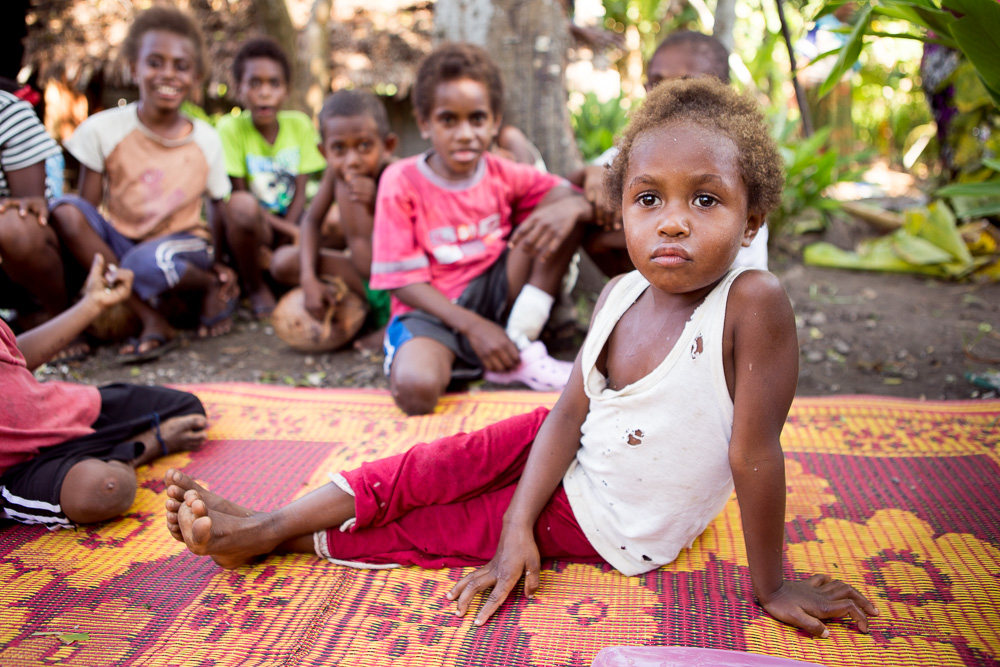Build on a Strong Foundation
GEOGRAPHY
Vanuatu is a Y-shaped tropical archipelago located in the South Pacific Ocean with over eighty islands, sixty-five of which are inhabited. The Solomon Islands lie to the north, New Caledonia to the south, Fiji to the east, and the Coral Sea and Australia to the west. The mostly volcanic archipelago extends 560 miles (900 kilometres) from north to south and has an area of 5,700 square miles (14,760 square kilometres). Espiritu Santo is the largest island. Port Vila, the capital, which was also the colonial headquarters, is on the south-central island of Efate.

The islands are prone to natural disasters including earthquakes, cyclones and volcanic eruptions. There are seven active volcanoes scattered throughout the islands. The island of Ambae erupted in September of 2017 and again in 2018. The entire population of about 11,000 people was evacuated. Rising sea levels threaten to erode the land; and pollution from vehicle fumes, oil from boats, and plastic waste badly affect the environment. In 2018, the Government passed a law that banned the use of plastic bags in the country.
Each year Vanuatu can expect an average of 8 to 10 cyclones. Cyclone Pam, a category 5 tropical cyclone hit the island nation in March 2015. It was one of the worst cyclones on record. Around 75,000 people needed emergency shelter and 96% of the crops were destroyed.
EDUCATION
Parents are a child’s first teachers before moving on to the education system to acquire the skills for a better life and standard of living.
The arrival of missionaries and the New Hebrides Condominium changed the education system and lives of the people. Christianity changed the social system and the role of men and women, while the Condominium created a double school system – one in English and another in French.
In the first three years of school, children in the towns learn Bislama, while children in the rural areas learn their own local language. Primary education is not free or compulsory. It is provided by law under three main objectives: access, quality and management. The government assists its schools subsidizing the tuition fees for the first six years to enable more children to have access to education. Many children in rural areas walk long distances to go to school; some even have to leave home and attend boarding school at a very young age.
Secondary education is only available to those who can afford it. Most families can only afford to educate their firstborn child. If the firstborn is a girl, she may be overlooked and educational opportunities are given to the eldest boy.
RELIGION
Originally, the people of Vanuatu had their own way of worship, and each island had their own area where the dead were supposed to have gone to rest, as well as their own gods. For example, the island of Torba had Quat, Malo Island near Santo had Tokotaitai, Penama had Takaro, the Shepherds islands in Shefa Province had Supwe, and Futuna had Majikjiki among others. The Vanuatu people did not worship animals or plants but believed there was a creator somewhere in the heavens, and they offered sacrifices to that being. Every community recognizes important places associated with their ancestry and other spirits. These “taboo places” may be mountain peaks, offshore reef formations, or rocky outcroppings. People avoid these locations and treat them with respect. Missionaries and explorers, like traders and blackbirders, arrived at about the same time in the 19th century. The islands were distributed among the denominations to bring Christianity to Vanuatu. Missionaries arrived on the southern islands and slowly proceeded north. The Catholic Church went to the south, Presbyterian on Efate, Anglican to the North, and Seventh Day Adventist on Malakula. First the European missionaries arrived and then the Polynesian. The Presbyterians, which is currently the largest denomination, established their first church in 1852, after the first missionary was martyred upon his arrival in 1838.
Today, Christianity comprises approximately 83% of the total population, while 17% is made up of other religious groups, customary beliefs and cults. Vanuatu churches worship through song and dance enhanced with Vanuatu traditions and cultures. Churches present are Presbyterian, Anglican, Roman Catholic, Seventh Day Adventist, and Church of Christ. The Vanuatu Christian Council provides a platform for those churches to work together ecumenically across the islands.
Christianity deeply impacted ancestral culture and religious practices as well as the system of governance and social life. Christianity opposed the practice of cannibalism and the local religion was considered witchcraft. Christianity changed a decentralized system of life in the villages to a centralized form of governance, as the missionaries moved people from their various locations to a central point where they built churches, schools, and hospitals and began teaching them the good news of Jesus Christ. Even though Christianity is said to unite families, it also divides families as there are so many different groups, as well as cults.
WOMEN
In the past 20 years, there have been changes for women in Vanuatu. The gender gap in literacy and education has narrowed. In some provinces, girls outperformed boys in school attendance.
Since independence in 1980, five women have been elected to the National Parliament. Recent reports indicate that women represent just 3% of total senior/executive government positions. More often than not, women are excluded from decision making and are absent from leadership positions.
Women represent 40% of the labour force in both public and private sectors compared to 60% of men. Women are usually full time homemakers caring for children, the elderly, people with disabilities and other family members. However, in terms of subsistence economy more women are involved than men (49% and 41% respectively). This makes them more susceptible to poverty, climate change, disasters and other livelihood stresses.
The opportunity for women to set up businesses is limited as they lack access to capital, financial services and markets. This is particularly the case for rural women. Despite these discriminatory issues, women are participating in the business sector in their own ways. They earn their living selling clothes, vegetables, and fruits at the market.
There are more female-headed, single parent households with children, grandchildren or extended family members compared to male headed households. Even though much of the burden of household chores rest upon women, their life expectancy is higher than that of men.
Gender-based violence is a serious issue affecting women and girls. Approximately 60% of women in Vanuatu have experienced some form of physical and/or sexual violence in their lives, of which 21% were left with permanent injuries. The Family Protection Act is the legal framework that protects and supports women in cases of domestic violence.
In the current Parliamentary democracy in Vanuatu, there are provisions in the Constitution for gender equity/equality, but no political will to implement it. From a Christian perspective, the Bible also depicts male and female as partners (Genesis 1:26), but religious institutions are not doing their part to encourage women to use their potential. If the government, different religious groups and chiefs cooperated in the effort to address the gender equality imbalance that would greatly improve the fundamental rights of women.
CHILDREN

Since Vanuatu ratified the convention on the Rights of a Child in 1992, women’s reproductive and children’s health have been key national priorities of the government. Reproductive and child health are defined as a state of complete physical, mental, and social well-being. However, Vanuatu failed to achieve its 2015 Millennium Development goals to reduce maternal and infant mortality. Most deaths in children under 5 are estimated to be due to malnutrition, and the increase in stunting is more likely linked to improper feeding practices.
It is estimated that 75% of the population live in rural areas with poor transport and communications, less qualified health care givers, fewer human resources and poor health facilities. A major health issue for women, besides reproductive health and maternal mortality, is breast and cervical cancer, since screening and treatment are limited.
Vanuatu’s estimated population growth is one of the highest in the Pacific Region. The high fertility rates places a considerable economic burden on people’s livelihoods. Because it is a male dominated society, certain attitudes have an adverse impact on reproductive and child healthcare choices and behaviours. The promotion of family planning and service delivery are necessary. Children suffering from malnutrition do not recover from childhood illnesses, such as diarrhoea, pneumonia, or other contracted diseases. Evidence based interventions are necessary to reduce the maternal, new-born and child morbidity and mortality rate. It means to create access to services that provide antenatal care, postnatal care, skilled birth attendance, early essential care, emergency obstetric and new-born care. It is important to educate mothers about early and exclusive breastfeeding for the first six months, micronutrient supplementation, deworming, immunization, and prevention and management of childhood illness and malnutrition.
Malnutrition is a concern in both rural and urban areas. Vanuatu’s traditional diet is high in carbohydrates and low in protein, and the introduction of processed, western foods has aggravated the wellbeing of a child.

